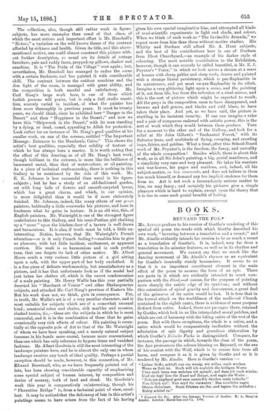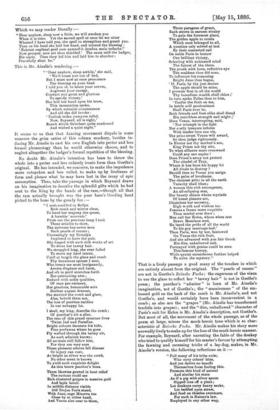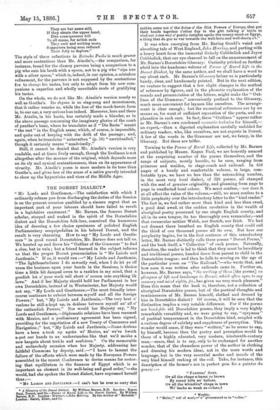BOOKS.
REYNARD THE FOX.•
Ma. AINSLIE prefixes to his version of Goethe's rendering of this
cynical old poem the words with which Goethe described his own work, " hovering between a translation and a recast ;" and Mr. Ainslie evidently intends his version to be as much a recast as a translation of Goethe's. It is, indeed, very far from a translation in its minister features, as well as in its rhythm and general movement. We cannot say that we much like the dancing movement of Mr. Ainslie's rhymes as an equivalent
for Goethe's ironically stately hexameters. It seems to us that it is an important constituent element in the main effect of the poem to assume the form of an epic. There are parts in it which are evidently intended to court com- parison with the Iliad,—of course, for the purpose of pointing more sharply the satiric edge of its cynicism ; and without
this ostentation of epical gravity and demureness, a great deal of the grimness of its satire would be lost. It is true that in the formal attack on the worldliness of the mediawal Church contained in the eighth canto, there is evidence of some purpose distinct from satire. Indeed, there are passages there, retained by Goethe, which look to us like interpolated moral patches, and which are out of harmony with the biting satire of the rest of the poem. But with these exceptions, the whole is a satire, and a satire which would be comparatively ineffective without the affectation of epic dignity and grandiose elaboration by
which Goethe's Reiizelee Fuchs is distinguished. Compare, for
instance, the passage in which, towards the close of the poem, the Ape pronounces the solemn blessing ou Reynard, on the eve of his combat with the Wolf, which is to secure him from all harm, and compare it as it is given by Goethe and as it is rendered by Mr. Ainslie. Here is Goethe's version :—
" Lieber Neffe, schlaft nnr ein wenig, wir willen euoh wecken Wenu es Zeit hit. Hoch will ich sogleich die heiligen Norte ilber each lesen von welohen ieb sprach', auf dasa ich ouch starke. Hod ale legt' ihm die Hand ant Haupt, and sagte die Norte : Nekrist negibanl geid cam namteflih dnudna mein tedacbs " Nun Gluck anf ! Nun seyd ihr verwahrt ! Das niimliche sagto Oheim Grimbart. Dann Mitten sic ihn, and legten ihn sohlafen : Habig schlief er."
Reynard the For. After the German Version of Goethe. By A. Douglas Ainslie. London: Macmillan and Co. BM.
Which we may render literally :-
"Dear nephew, sleep now a little, we will awaken you
When it is time. Yet the sacred spell at once let me utter Whereof I have told you, the spell to strengthen and guard you. Then on his head she laid her hand, and uttered the blessing : Nekrast negibanl geid sum namteflih dnndna mein tedachs!' Now prosper, now art thou shielded ! The same said the badger, His uncle. Then they led him and laid him to slumber: Peacefully slept he."
This is Mr. Ainslie's rendering :-
"' Dear nephew, sleep awhile,' she said,
' We'll rouse you out of bed, But I must now at once pronounce The blessing on your head I told you of, to brace your nerves, Augment your energy, Conduct you great and glorious To speedy victory.'
She laid her hand upon his brow, This incantation spoke, By which celestial countenance And aid she did invoke : Toolook tedax yumyum toile], Now, Reynard, all is right,' Result which Grimbart quite confirmed And wished a quiet night."
It seems to us that that dancing movement dispels in some measure the grim satire of this solemn mockery, besides in- ducing Mr. Ainslie to cast his own English into perter and less formal phraseology than he would otherwise choose, and to neglect altogether the badger's formal repetition of the blessing.
No doubt Mr. Ainslie's intention has been to throw the whole into a perter and less sedately ironic form than Goethe's original. He has intended, we conceive, to make the impudence more outspoken and less veiled, to make up by liveliness of form and phrase what he may have lost in the irony of epic assumption. Thus, take the passage in which Reynard draws on his imagination to describe the splendid gifts which he had sent to the King by the hands of the ram,—though all that the ram actually brought was the poor hare's bleeding head picked to the bone by the greedy fox :—
" I next confided to Bellyn
Rich comb and mirror clear, To hand her majesty the queen, A humble souvenir.'
From out the precious heap I took These articles to show, The universe has never seen Such pearls of rococo; Unceasingly my Ermelyn Implored to have the pair, She longed with such rich works of art To dress her tawny hair.
We struggled long, she ever failed To move my fixed intent, Until at length the glass and comb Thy beauteous sponse I sent, Who treats me most benignantly, Averts disgrace and harm, And oft in peril stretches forth Her patronising arm ; Endued with noble qualities, Of race pre-eminent, Her gracious, honourable acts Declare august descent, She merited the comb and glass, Alas, beheld them not, The loss of peerless rarities In our unhappy lot.
I shall, my king, describe the comb; Of panther's rib a slice, The rest of this grand creature lives 'Twixt Ind and Paradise.
Bright colours decorate his hide, Fine perfumes where he goes Fly wafted through the balmy air, As each admirer knows ; All animals still follow him, For they are very sure These pleasant odours fell disease Or injury can cure, As bright as silver was the comb, No other scent is known To yield such exquisite delight As this brave panther's bone.
There likewise graved in bent relief The curious could see Rich clustered grapes in massive gold And lapis lazuli. In middle distance visible Did Trojan Paris stand, With Juno, sage Minerva too Close by at either hand, And Venus also near to them, Three paragons of grace, Each strove in earnest rivalry To gain the foremost place, The golden apple to retain Which once belonged to all, A question only solved at last By their concerted call On noble Paris to bestow One brilliant victory, Selecting with unbiassed mind The fairest of the three.
The youth with keen, reflective eye The maidens then did scan, To influence his reasoning Bright Juno thus began, If, Paris, by thy just decree The apple should be mine, I promise first in all the world Thy boundless wealth shall shine ;' In turn spoke Pallas thus to him, ' Confer the fruit on me, In battle still predominant Shall Paris ever be, Both friends and foes alike shall dread His matchless strength and might; Here Venus, interrupting, said, Nor triumph in the fight Nor costly treasure infinite With tender love can vie, The prize sweet Venus will award, So thou judge righteously.
Is Hector not thy mother's son, King Priam not thy sire, To what alliance more renowned Could any one aspire ?
Does Priam's army not protect The citadel of Troy, Where it has been his happy lot All rivals to destroy ?
Should then to Venus you assign The palm of loveliness, The choicest prize in all the earth Veracity shall bless ; A woman this rich recompense, An all-eclipsing star, Her beauty shines where myriads Of lesser planets are, Illustrious her ancestry, High worth and wisdom too Possess a frame more exquisite Than mortal ever drew ; Men call her Helen, whom when erg Brave Menelaus wed, He lured the pride of all the world To his gay marriage-bed.'
Then Paris, won by her, bestowed On Venus the rich fruit, And she advanced with yon fair Greek His dire, unhallowed snit.
Portrayed with genius could be seen This famous history, While quaint escutcheons further helped
To solve the mystery."
That is a lively passage a good many of the touches in which are entirely absent from the original. The " pearls of rococo ". are not in Goethe's Beineke Fuchs; the eagerness of the vixen to use the glass to reflect her "tawny hair" is not in Goethe's poem ; the panther's "admirer " is born of Mr. Ainslie's imagination, not of Goethe's ; the " massiveness " of the em- bossed gold on the back of the comb is Mr. Ainslie's, and not Goethe's, and would certainly have been inconvenient in a comb ; as also are the " grapes " (Mr. Ainslie has transformed tendrils into grapes) ; and the "dire, unhallowed" character of Paris's suit for Helen is Mr. Ainslie's description, not Goethe's. But most of all, the movement of the whole passage, as of the poem at large, misses the mock-heroic tone which is so char- acteristic of Beineke Fuchs. Mr. Ainslie makes his story more avowedly lively to make up for the loss of the mock-heroic manner. For example, Reynard, after narrating the fable of the donkey who tried to qualify himself for his master's favour by attempting. the fawning and caressing tricks of a lap-dog, makes, in Mr- Ainslie's version, the following reflections on it :—
" Full many of his tribe exist,
Who envy others' bliss, And yet derive no benefit Themselves from feeling this. Promote this kind of animal And similar his state As if a pig with silver spoon Sipped ices off a plate ; Let donkeys carry heavy sacks, Lie bedded upon straw, And feed on thistles evermore, For such is Nature's law. Employed in any other way, They are but asses still, If they obtain the upper hand, Dire consequences will To all ensue, for selfish ends They seek and nothing more, Supporters being soon reduced Their fully to deplore."
The style of these reflections in Reineke Fuchs is much graver and more sententious than Mr. Ainslie's,—the comparison, for instance, found for the clumsy parvenu being a comparison to a pig who eats his broth with a spoon, not to a pig who "sips ices with a silver spoon," which is, indeed, in our opinion, a mistaken refinement, for the parvenu is not supposed by the sententious fox to change his tastes, but only to adopt from his new com- panions a superfine and wholly unsuitable mode of gratifying his tastes.
On the whole, we do not like Mr. Ainslie's version nearly so well as Goethe's. Its rhyme is so sing-song and monotonous, that it rather wearies us, while the loss of the mock-heroic form is, to our ear, a very serious loss indeed. Moreover, here and there Mr. Ainslie, in his haste, has certainly made a blunder, as in the above passage concerning the imaginary glories of the comb of panther's bone, where he translates as if " Die Rests " meant "the rest" in the English sense, which, of course, is impossible, and quite out of keeping with the drift of the passage ; and, again, when he translates " unberathen " (p. 56) " nnvictualled," though it certainly means " unadvisedly."
Still, it cannot be denied that Mr. Ainslie's version is very readable, and at times lively enough, though the liveliness is not altogether after the manner of the original, which depends more on its sly and cynical sententiousness, than on its appearance of vivacity. Mr. Ainslie's poem is more modern in its tone than Goethe's, and gives less of the sense of a satire gravely intended to show up the hypocrisies and vices of the Middle Ages.




































 Previous page
Previous page